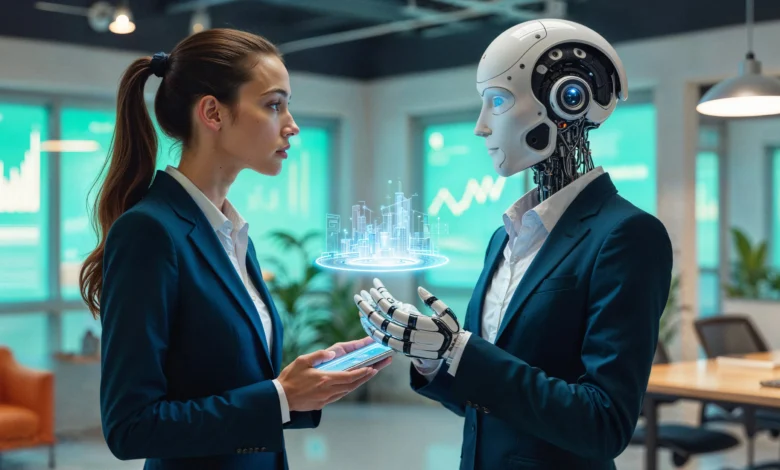
Artificial Intelligence (AI) has become a transformative force across industries, and Human Resources (HR) is no exception. From AI-driven chatbots that streamline employee inquiries to predictive algorithms that assist in hiring decisions, organizations are adopting AI to optimize HR functions at an unprecedented pace. According to recent surveys, more than 65% of global companies now use AI-based tools in at least one HR process.
Yet, despite the efficiency and scalability AI provides, experts consistently emphasize one reality: human professionals remain irreplaceable in HR. Empathy, ethical reasoning, and cultural leadership are areas where no algorithm can fully replicate the value of human judgment. This article explores the current landscape of AI in HR, its benefits, its limitations, and why the human element will always be at the core of human resource management.
What Is AI in Human Resources?
AI in HR refers to the use of machine learning, natural language processing (NLP), and robotic process automation (RPA) to enhance workforce management. The goal is not only to improve efficiency but also to provide deeper insights into employee behavior, performance, and organizational dynamics.
Examples of AI applications in HR include:
-
Recruitment and Talent Acquisition: AI-powered platforms screen resumes, assess candidate profiles, and even conduct initial interviews through automated chatbots.
-
Employee Onboarding: Virtual assistants guide new hires through paperwork, policies, and orientation.
-
Performance Management: AI tools analyze productivity data, offering real-time feedback and personalized growth plans.
-
Employee Engagement: Sentiment analysis tools detect morale shifts by analyzing employee surveys, emails, or collaboration tools.
-
Predictive Analytics: AI models forecast employee turnover, helping HR leaders develop retention strategies.
Benefits of AI in HR
The growing adoption of AI in HR is driven by measurable advantages:
1. Efficiency and Time-Saving
AI automates repetitive and administrative tasks such as payroll processing, scheduling, and benefits administration, freeing HR professionals to focus on strategic work.
2. Data-Driven Decision-Making
Predictive analytics enable HR leaders to anticipate talent shortages, identify high-potential employees, and optimize workforce planning.
3. Enhanced Employee Experience
Personalized career development pathways, AI-driven learning platforms, and automated responses to common queries improve the overall employee experience.
4. Cost Reduction
By reducing human errors and administrative overhead, AI adoption can significantly lower HR operational costs.
5. Scalability
AI systems handle large volumes of data seamlessly, allowing HR teams to manage global workforces without proportional increases in staff.
The Irreplaceable Human Element in HR
While AI offers numerous benefits, it has clear limitations. HR, by definition, deals with humans—and certain dimensions of the workplace require emotional intelligence, judgment, and cultural understanding that AI cannot provide.
1. Employee Care and Well-Being
AI can detect early signs of burnout or disengagement through data analysis, but it cannot provide genuine empathy or human connection. Employees often need reassurance, mentorship, and compassion—qualities uniquely human.
2. Legal and Ethical Decisions
AI algorithms can support compliance by tracking regulatory updates, but the interpretation and application of employment law require nuanced judgment. Disputes, grievances, and legal considerations demand human oversight to ensure fairness and accountability.
3. Cultural Development
Organizational culture is built on shared values, human interaction, and leadership. No algorithm can foster belonging, trust, or loyalty the way human leaders can. Cultural development requires vision, storytelling, and lived experience.
4. Conflict Resolution
Workplace disputes are complex and emotional. While AI can provide data-driven insights, mediation, negotiation, and conflict resolution depend on interpersonal skills and empathy that machines cannot replicate.
AI + Human Synergy: The Future of HR
The future of HR is not a competition between AI and humans but a collaboration between the two. Organizations that find the right balance will unlock maximum value.
Key strategies for balance include:
-
Automate the routine, humanize the complex. Use AI for repetitive, data-heavy processes and let humans lead in areas requiring judgment and empathy.
-
Reskill HR professionals. Train HR staff to work alongside AI tools, focusing on skills such as ethical decision-making, coaching, and organizational development.
-
Create hybrid workflows. Develop processes where AI provides insights and recommendations, but final decisions remain human-led.
-
Prioritize transparency and ethics. Ensure AI tools are free from bias and that employees understand how their data is used.
This hybrid model ensures that technology enhances HR without eroding the human qualities that define strong organizations.
Frequently Asked Questions (FAQ):
Q1: Can AI replace HR professionals?
No. While AI automates tasks like resume screening and payroll, HR professionals remain vital for employee well-being, cultural development, and legal decisions.
Q2: What are the main benefits of AI in HR?
AI in HR improves efficiency, reduces costs, and enables data-driven decision-making. It also enhances employee experience through personalized career development.
Q3: Which HR tasks should remain human-led?
Conflict resolution, employee care, organizational culture, and legal compliance require human empathy and ethical reasoning.
Q4: How should companies balance AI and human HR roles?
The best approach is hybrid: AI handles repetitive processes, while humans focus on leadership, empathy, and complex decision-making.
Q5: What is the future of AI in HR?
The future lies in AI-human collaboration, where automation supports efficiency, and humans provide cultural leadership and ethical oversight.
The most successful organizations will not be those that replace humans with AI but those that empower humans through AI. By embracing a hybrid model—where technology manages routine tasks and humans lead with compassion and judgment—companies can build workplaces that are efficient, fair, and deeply human.
In the end, AI in HR is not about replacing people, but about redefining how people and technology work together to create thriving organizations.


